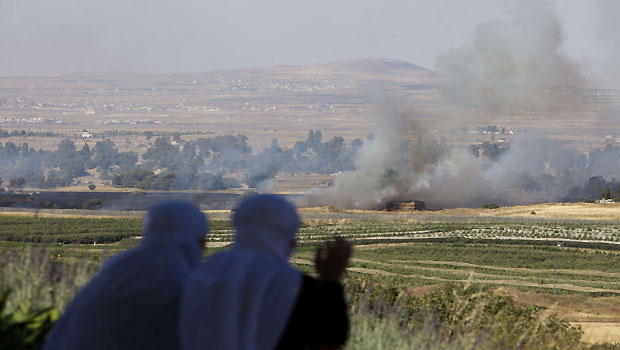
Two Israeli-Druze women look from the Israeli side at the Israel-Syria ceasefire line in the Golan Heights at smoke rising where clashes appeared between Syrian rebels and forces loyal to the regime near the Quneitra crossing on June 6, 2013. (AFP/Ahmad Gharabli)
Beirut/London, Asharq Al-Awsat—The battle continued to rage in the Golan Heights yesterday following a sudden offensive by the Free Syrian Army (FSA) to take control of the Quneitra border crossing from Assad regime forces. Ultimately, the Syrian rebels were only able to hold the border crossing for a few hours before it was retaken by the Assad regime.
Despite this reversal in fortune, the FSA continued to contest the border crossing, with clashes continuing into the night. Quneitra is the only open crossing between Syria and the Israeli-controlled Golan Heights
Israel is increasingly concerned about the Syrian conflict spilling over into the Golan Heights, as represented by the most recent battle over the Quneitra border crossing. An Israel security official, speaking to Agence France-Presse (AFP) summed up the dilemma being faced by Tel Aviv, saying: “”It is very worrying because on the one hand you have jihadists and Islamists who are fighting there, and on the other hand, you also have government forces which are allied with Hezbollah.”
“We certainly don’t want to have Hezbollah on two fronts,” the Israeli source added.
The Israeli military took the precautionary measure of banning civilians from entering Kibbutz Ein Zivan, a communal settlement that lies just hundreds of meters from the border fence.
The Assad regime had been forced to use tanks and heavy weaponry to retake the border crossing, resulting in the Israeli Defense Force [IDF] filing a complaint to the UN over the Syrian army’s presence in the ceasefire zone.
Two UN peacekeepers were also wounded in the fighting. This prompted Austria to announce that it will be withdrawing its soldiers from the Golan Heights, saying that the threat had “reached an unacceptable level”.
Austrian troops make up more than one third of the 900-strong UN force monitoring the demilitarized zone and Quneitra. There are reportedly 380 Austrian peacekeepers in the UN Disengagement Observer Force (UNDOF).
The UN Security Council has strongly condemned fighting between the Syrian army and rebel forces at the Quneitra border crossing in the Golan Heights, which resulted in the injury of two UN observers.
The Security Council called on the Assad regime and the Syrian rebels to respect the presence of the observers in the region, cooperate with them, allow them to operate freely, and ensure their safety
In other news, Russian Foreign Minister Sergei Lavrov announced that Syrian Foreign Minister Walid Muallem will represent the Assad regime at the expected “Geneva II” conference.
An Arab source, speaking to Asharq Al-Awsat on the condition of anonymity against the backdrop of the Arab League’s foreign ministers’ meeting in Cairo, claimed that a deal has been tabled which would see Assad remaining as president until 2014 but “without executive powers.” The source added that in this deal executive power would rest with “a government that enjoys full powers, including running security and defense affairs.”
The Arab League meeting also saw the issuance of a resolution which expressed “strong condemnation” of all forms of foreign intervention in Syria, particularly by Hezbollah.
The final communique of the meeting reiterated the Arab League’s vision towards resolving the Syrian crisis, urging the “formation of a transitional government” to pave the way for a “peaceful transition of power.”
Al-Qaeda leader Ayman Al-Zawahiri has meanwhile called on opposition jihadists fighters to avoid doing the work of the west by establishing a moderate and democratic government in post-Assad Syria, and instead form an Islamic emirate.
In a 22-minute recording posted on Islamist websites on Thursday to mark the 65th anniversary of Israel’s creation, the Al-Qaeda leader said: “America, its agents and allies want you to shed your blood and the blood of your children and women to bring down the criminal Ba’athist regime, and then set up a government loyal to them and to safeguard Israel’s security.”
He called on the people of Syria to instead seek to establish an Islamic emirate.
“Lions of the Levant, unite around this honorable goal and rise above sectarian affiliations,” Al Zawahri said.
